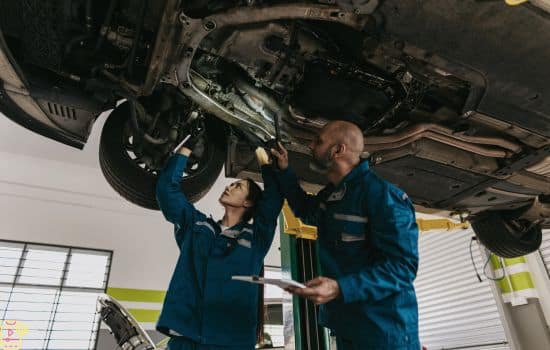Anúncios
Ever wondered how engines work but felt overwhelmed by complex manuals? Learning mechanics just got a whole lot easier with specialized apps that turn confusing concepts into fun, bite-sized lessons.
Why Traditional Mechanics Learning Can Feel Like Rocket Science 🚀
Let’s be real – cracking open a traditional mechanics textbook can be intimidating. You’re bombarded with technical jargon, complicated diagrams that look like abstract art, and explanations that assume you already have an engineering degree. Most people give up before they even understand what a camshaft does.
Anúncios
But here’s the thing: mechanics isn’t actually that complicated once someone breaks it down properly. The problem isn’t you – it’s the way the information has traditionally been presented. We’re living in an era where you can learn literally anything from your phone, so why should understanding how your car works be any different?
The automotive industry is evolving rapidly, and having basic mechanical knowledge isn’t just for professional mechanics anymore. Whether you want to save money on repairs, impress your friends, or just satisfy your curiosity about how things work, there’s never been a better time to dive into the world of engines and transmissions.
Anúncios
The App Revolution in Mechanical Education 📱
Specialized learning apps have completely transformed how we acquire new skills. Instead of sitting through boring lectures or trying to decipher outdated manuals, you can now learn mechanics through interactive lessons, 3D animations, and gamified challenges that actually make the process enjoyable.
These apps understand something crucial: people learn better when they’re engaged and having fun. By combining visual learning with hands-on practice scenarios, mechanics apps create an immersive experience that sticks with you way better than memorizing definitions from a textbook ever could.
What Makes a Great Mechanics Learning App
Not all educational apps are created equal. The best mechanics apps share several key features that set them apart from generic learning platforms:
- Interactive 3D models that let you explore engine components from every angle
- Step-by-step tutorials that break down complex systems into manageable chunks
- Real-world scenarios and troubleshooting exercises
- Progress tracking to keep you motivated
- Community features where you can ask questions and share discoveries
- Offline access so you can learn anywhere, even in your garage
Breaking Down the Engine: From Zero to Hero ⚙️
One of the coolest things about modern mechanics apps is how they demystify engine components. Instead of staring at a static diagram wondering what connects to what, you can actually see how parts move together in real-time animations.
The four-stroke cycle, for example, sounds complicated until you watch an animated piston moving through intake, compression, combustion, and exhaust phases. Suddenly, it all clicks. You’re not just memorizing terms – you’re actually understanding the mechanical ballet happening thousands of times per minute inside an engine.
Understanding the Basics Without the Headache
Good mechanics apps start with the fundamentals and build progressively. You’ll begin with basic concepts like how internal combustion works, then gradually move into more complex topics like timing belts, fuel injection systems, and turbochargers.
The beauty of app-based learning is that you can go at your own pace. Struggling with valve timing? Replay that lesson as many times as you need. Already familiar with basic engine components? Skip ahead to more advanced topics like hybrid systems or electric vehicle technology.
Hands-On Learning That Actually Works 🔧
Theory is great, but mechanics is ultimately a practical skill. The best apps bridge this gap by offering virtual diagnostic scenarios where you apply what you’ve learned. Imagine getting a description of symptoms – weird noises, performance issues, dashboard warnings – and using your knowledge to identify the problem.
These interactive troubleshooting exercises train your brain to think like a mechanic. You develop diagnostic intuition that goes beyond just knowing what parts are called. You start understanding cause and effect relationships in mechanical systems.
Augmented Reality: The Future is Now
Some cutting-edge mechanics apps are incorporating AR technology that lets you point your phone at an actual engine and see labeled overlays identifying different components. It’s like having X-ray vision for machinery. This technology is still evolving, but it’s already making the connection between theory and reality seamless.
From Beginner to Confident DIY Mechanic 💪
The journey from knowing nothing about mechanics to confidently performing basic maintenance might seem long, but with the right app, you can compress years of learning into months of focused practice.
Most people start with simple goals: understanding what mechanics are talking about, performing basic oil changes, or diagnosing check engine lights. As your confidence grows, you naturally become curious about more complex systems.
| Skill Level | Typical Tasks | Average Time to Learn |
|---|---|---|
| Beginner | Oil changes, tire pressure, fluid checks | 2-4 weeks |
| Intermediate | Brake pad replacement, battery service, diagnostics | 2-3 months |
| Advanced | Engine repair, transmission work, electrical systems | 6-12 months |
The Money-Saving Superpower 💰
Let’s talk about something everyone cares about: saving cash. Mechanics can be expensive, and for good reason – their expertise is valuable. But not every problem requires a professional. Many common issues can be diagnosed and fixed with basic knowledge and the right tools.
Understanding mechanics helps you avoid getting ripped off too. When you know what’s actually wrong with your vehicle, you can have informed conversations with mechanics and spot when someone’s trying to sell you unnecessary services.
The initial investment in learning – whether it’s an app subscription or time spent studying – pays for itself incredibly quickly. One avoided trip to the shop for something simple like replacing air filters or cabin filters can save you $50-100. Do that a few times and you’re already way ahead.
Building Real-World Confidence
There’s something deeply satisfying about fixing things yourself. The first time you diagnose and solve a mechanical problem on your own, you feel like an absolute genius. That confidence spills over into other areas of life too.
Plus, mechanical knowledge is surprisingly social. Once people know you understand cars, you become the go-to person for advice. It’s a great conversation starter and a genuinely useful skill that never goes out of style.
Gamification: Making Learning Addictive (In a Good Way) 🎮
The best mechanics apps borrow heavily from video game design. They incorporate achievement systems, progress bars, challenges, and rewards that trigger the same dopamine responses that keep you playing your favorite games.
This isn’t manipulation – it’s smart design that works with human psychology instead of against it. When learning feels like leveling up in a game, you naturally want to keep going. Suddenly you’re spending your coffee break learning about differential gears instead of scrolling social media.
Competition and Community Features
Many apps include leaderboards and challenges where you can compete with other learners. This friendly competition pushes you to engage more deeply with the material. Some apps even have forums or chat features where you can discuss concepts with fellow enthusiasts or ask experts questions.
The community aspect can’t be overstated. Learning mechanics can feel isolating if you’re doing it alone with old textbooks. Being part of a community of learners makes the journey more enjoyable and provides support when you’re stuck on tricky concepts.
Specialized Tracks for Different Interests 🏎️
Not everyone wants to learn about the same types of engines. Maybe you’re into classic cars, modern vehicles, motorcycles, or even small engines like lawn mowers. Good mechanics apps offer specialized learning tracks that cater to your specific interests.
This customization keeps the content relevant and engaging. If you own a diesel truck, you probably care more about compression ignition and turbocharger systems than you do about hybrid battery management. Targeted learning paths respect your time and focus on what matters to you.
The Electric Revolution: Staying Current 🔋
The automotive world is changing fast. Electric vehicles are becoming mainstream, and they require completely different knowledge than traditional combustion engines. Forward-thinking mechanics apps are already incorporating EV technology into their curricula.
Understanding both combustion and electric systems positions you perfectly for the future. As the vehicle landscape evolves, having broad mechanical knowledge across different propulsion technologies becomes increasingly valuable.
Hybrid Systems: Best of Both Worlds
Hybrids combine traditional engines with electric motors, creating fascinating mechanical challenges. Apps that cover hybrid technology give you insight into how these complex systems coordinate between power sources, regenerative braking, and battery management.
Practice Makes Perfect: Virtual Workshops 🛠️
Some advanced mechanics apps offer virtual workshop environments where you can practice repairs in a risk-free digital space. You can disassemble engines, replace components, and see the consequences of mistakes without any real-world cost.
This kind of practice builds muscle memory and procedural knowledge. When you eventually work on a real engine, the process feels familiar because you’ve already done it dozens of times virtually. It’s like using a flight simulator before piloting an actual plane.
Your Roadmap to Mechanical Mastery 🗺️
Starting your mechanics learning journey is simpler than you think. Download a quality mechanics app, commit to spending even just 15-20 minutes daily, and watch your knowledge compound over time. Consistency beats intensity when it comes to learning complex topics.
Supplement your app learning with hands-on experience whenever possible. Offer to help friends with basic maintenance, volunteer at community workshops, or practice on your own vehicle. The combination of theoretical knowledge from apps and practical experience creates deep, lasting understanding.
Don’t be discouraged if some concepts take time to click. Mechanics involves three-dimensional thinking and understanding systems thinking – skills that develop with practice. The apps are designed to present information in increasingly sophisticated ways as you progress, scaffolding your learning journey.
Beyond Cars: Universal Mechanical Principles 🔍
Here’s a bonus: the principles you learn studying automotive mechanics transfer to countless other applications. Understanding how engines work gives you insight into generators, power equipment, motorcycles, boats, and even industrial machinery.
Mechanical thinking – understanding forces, motion, energy transfer, and system interactions – is a universally valuable skill. Whether you’re troubleshooting a broken appliance or understanding how industrial equipment works, the foundational knowledge is remarkably similar.

Making the Commitment to Learn 🎯
The difference between people who successfully learn mechanics and those who give up usually comes down to consistency and choosing the right learning method. Apps succeed where traditional methods fail because they meet you where you are – on your phone, during small pockets of free time, with content designed for modern attention spans.
The mechanics knowledge you gain is yours forever. Unlike many skills that become obsolete with technological change, understanding how mechanical systems work remains relevant. Engines might evolve, but fundamental principles of physics and engineering stay constant.
So take the plunge. Download that mechanics app, start with the basics, and embrace the learning journey. In a few months, you’ll look back amazed at how much you’ve learned. You’ll understand systems that once seemed impossibly complex, you’ll save money on maintenance, and you’ll have gained a genuinely impressive skill that enhances both your practical abilities and your understanding of the world around you.
The engines that power our vehicles, tools, and equipment are marvels of engineering. Understanding them doesn’t require a degree or years of apprenticeship anymore – it just requires curiosity, a decent app, and commitment to learning. The mechanics world is waiting to reveal its secrets, and it’s way more accessible than you ever imagined. 🚗✨


